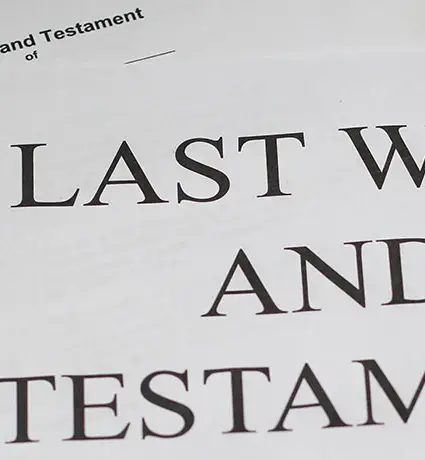
Who Can Witness a Will?
Witnessing a Will is no small responsibility and an important decision to make, both for the witness and the person writing the Will. As part of the Wills Act, witnesses are necessary to ensure the document becomes official and legally binding. Without witnesses, your Will is simply an ‘official looking’ document. Selecting your witnesses is an important step in the process. Make sure you understand who can and can’t witness your Will. By understanding this step of the legal process, you can ensure your Will is watertight and that your family is protected.
Before we get into options it is important to remember that witnesses don’t have to read the entire Will. They merely have to sign the attestation page, often at the back of a Will, meaning you can protect the information within if you don’t feel comfortable sharing the effects of your estate. The only time witnesses will need to see the contents of your Will is if any amendments are made to the body of your Will. The witnesses will need to sign for these changes.
Who Can’t Witness a Will?
The list of people who can’t sign a Will is much shorter than those who can. The minimum criteria are:
- They must be over 18 years of age
- They cannot be the executor or beneficiary of the Will
- They cannot be related to you, the executor, or the beneficiaries by blood, marriage, or civil partnership
No beneficiaries should witness a Will. In the event of a beneficiary or beneficiary’s spouse witnessing the Will, the beneficiary’s share of the Will would fail.
This is because a beneficiary, such as a spouse or child, may attempt to coerce the Will maker into giving them more property than originally planned.
CAN WITNESSES TO A WILL BE RELATED TO EACH OTHER?
While your witness cannot be a direct relative to you, your witnesses can be related to one another. This includes married couples, brothers and sisters, and a parent and a child.
As long as they are not a beneficiary to your Will, your witness’s relationship to one another will not affect your Will in any way.
Who Should I Ask to Witness My Will?
You should choose independent people to witness your Will. A work colleague, friend, neighbour, lawyer, and even GP can be the ideal witness. As mentioned above, witnesses can also be related to each other without affecting the Will so asking friend and his or her spouse can speed up the process.
Asking a GP to witness a Will is advisable when the estate owner is elderly or has a questionable mental capacity. The medical practitioner can ensure that at the signing of the Will the estate owner was of a sound state of mind. It is not uncommon for solicitors to insist upon this in the event of an elderly person’s Will.
Practical Tips
While no one under 18 years of age can sign a Will, it is practical to consider witnesses of a younger age. People of your age or lower are more likely to be alive should you pass away so picking someone younger is advisable.
Another practical tip is to avoid using a witness from another country. In the event of your Will being necessary, tracking down and communicating with parties across the globe can be time consuming and delay the execution of your estate.
Two Witnesses
Finally, keep in mind you need two witnesses present. Ensure you plan and schedule a time for all parties to witness and sign your Will.
Witnesses should sign the Will with their signature as well as their full name in print lettering, address, and occupation to ensure easy identification. Remember to date your Will to ensure the most current version of your Will is executed.
Writing a Will is a prudent exercise and a good way to ensure your loved ones are protected. The correct witnesses go even further to protect this important document. Understanding who can and should witness your Will is an easy yet important step to get right to ensure your wishes are respected by the law. As always, consult one of Smith Partnership’s Will and Probate solicitors should you have any questions. Our plain-speaking, accessible solicitors are on hand to assist with any and all concerns so contact us with any and all concerns.
If you’d like to find out more about the legal services offered by Smith Partnership, don’t hesitate to contact us via info@smithpartnership.co.uk. Alternatively, speak to a member of our team directly on 0330 123 1229.

Share this article






















